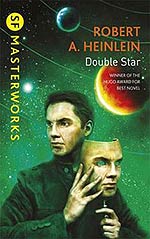
![]() thrak
thrak
9/14/2013
![]()
"Let us protect our own - but let us not be seduced by fear and hatred into foolish acts. The stars will never be won by little minds; we must be big as space itself."
It's not difficult to argue that Robert A. Heinlein was the greatest out of SF's Big Three. Out of him, Asimov and Clarke, only one of them was consistently able to write character and dialogue. He pioneered many of the subgenres and basic ideas of SF, and wrote great stories in the ones he didn't himself help to develop. So why have I read far more Clarke and Asimov than Heinlein? Michael Moorcock nails much of what makes me uncomfortable with the man's work far more eloquently than I ever could here. To illustrate from my experience, last year I read Heinlein's 'Have Spacesuit - Will Travel', one of his classic juveniles. It's a tremendously fun, fast-paced space adventure filled with well-drawn characters, inventive aliens and sound physics. So why didn't I like it? At the end, the Mother-Thing's race kill an entire planet-ful of aliens because they deem them dangerous and aggressive. They then put mankind on trial and decide that humans aren't quite dangerous and aggressive enough to warrant genociding them out of existence. Basically, I find this morally objectionable as well as wildly inconsistent. No one has the right to mete out judgement to other species, or rain down destruction on a less powerful people utterly unable to defend themselves against you as punishment for aggression. I found the Mother-Thing's people to be smug and hypocritical, yet the narrative and the narrator side with them, and if you have a problem with that, or with the way that the alien aggressors' ugliness is treated as part and parcel of their villainy and why they deserve to be destroyed, Heinlein couldn't care less. Heinlein's strong, uncompromising attitude colours much of his more iconic work - like, say, Starship Troopers, even more so. This is, of course, Heinlein's prerogative and Heinlein's opinion, and I in no way deny his right to it, but it makes much of his work difficult for me to enjoy uncritically.
So imagine my surprise on finding out that 'Double Star' finds Heinlein defending democracy and equality. (Mea cuplua - it's worth remembering that people you disagree with are as capable of complexity as anyone else). The premise of the novel - a sleazy out-of-work actor his hired to impersonate a politician - could be horrifically cynical, but it actually turns out to be the opposite. True, you have to find a super good reason to justify duping the public, but the book isn't really about that. It's about Lorenzo Smythe's transformation from a xenophobic, selfish and petty man into the genuinely honest, altruistic and thoroughly moral politician Bonforte.
Many of Heinlein's characters are born special. Kip from 'Have Spacesuit - Will Travel' has his fair share of adversity to overcome in the shape of his poor background and unsympathetic surrounding community, but there's no question about his intelligence and courage, even before he discovers he's a kid genius and saves the world. Lorenzo Smythe is a more engaging protagonist because he has to overcome personal issues as well as situational difficulties. As he studies Bonforte through recordings of his life, speeches and beliefs, he comes to understand where the man's moral centre and convictions come from, and to cast of the shackles of his own prejudices. It is Lorenzo, not the real Bonforte, who makes the speech quoted at the top of the page. Like Bonforte, he comes to realise that in order to reach the stars, humanity is going to have to overcome its petty prejudices, and that it is imperative that humanity not turn the stars into yet another empire run on exploitation and human privilege.
Heinlein's gift with characterisation and dialogue is in full swing here. The novel is told in first person from Lorenzo's point of view, and his crude, sarcastic and cynical voice is frequently hilarious and ultimately a very canny instrument with which to tell this particular story. His transformation is handled deftly and subtlety as his character changes and he adopts more and more of Bonforte's dignified tone. 'Double Star' is as breezy, fun and engaging as 'Have Spacesuit - Will Travel', but not only do I find its outlook more palatable, it is also an excellent character study.
http://goldenapplesofthewest.blogspot.co.uk/2013/09/robert-heinlein-double-star-1956.html